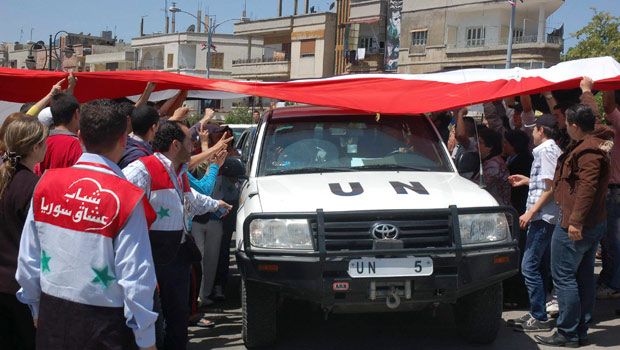
Beirut, April 25: Bashar Assad’s international allies must realize the Syrian president is “finished” and persuade him to step down to avoid further bloodshed, Tunisian President Moncef Al-Marzouki said in a newspaper interview published on Tuesday.
“The Russians and Chinese, and the Iranians must understand that this man is finished and they cannot defend him. They must persuade him to leave power and hand over to his deputy,” Marzouki told the regional Arab newspaper Al-Hayat.
Assad “will go one way or another ... dead or alive,” he added.
Addressing the Syrian leader directly, he said: “It’s better for you and your family to leave alive, because if you decide to leave dead, that means that you have caused the deaths of tens of thousands of innocents. Enough blood has been shed.”
Tunisia, whose peaceful revolution a year ago sparked the Arab Spring uprisings that saw off autocratic leaders in Egypt, Libya and Yemen, offered to give Assad political asylum in February to stem the violence in Syria, where the United Nations says government forces have killed 9,000 people.
Syrian authorities say they are fighting foreign-backed Islamist militants, who they blame for killing more than 2,500 soldiers and police.
UN observers are launching a monitoring mission in Syria to oversee an April 12 cease-fire agreement brokered by former UN Secretary General Kofi Annan.
Fewer than a dozen from a planned mission of 300 observers have arrived so far, and the violence has continued. Activists said 30 people were killed across Syria on Monday.
Marzouki said the mission had little chance of ending the killings. “I do not expect it to succeed, because the number of observers is very small. Three hundred people cannot do anything,” he said. “In Kosovo there were thousands of observers.”
3 intelligence agents killed
Meanwhile, activists said three Syrian intelligence officers were killed in Damascus on Tuesday, the latest attack on regime targets as the country’s 13-month conflict grows increasingly militarized.
The attack took place as a UN team observing Syria’s violence-ridden truce was visiting another area near the capital, the restive suburb of Douma. Activists and amateur videos reported that the area was being shelled.
The Britain-based Syrian Observatory for Human Rights said the three officers were killed early Tuesday in the Barzeh neighborhood but gave no further information. The Syrian government did not comment.
Rebels seeking to topple Assad have ramped up attacks on military targets and security officers, some of whom have been killed in their cars on the way to work.
The UN says more than 9,000 people have been killed since the conflict began in March 2011 with mostly peaceful protests calling for political reforms. The government brutally cracked down, deploying troops, snipers and pro-government thugs to quash dissent, while many in the opposition have armed themselves for protection.
The international community remains divided on how to stop the conflict, with the US and many Western nations calling for Assad to leave power while Russia and China have stood by Damascus.
All, however, have endorsed a six-point plan by envoy Kofi Annan that calls for a cease-fire to allow for talks between all sides on a political solution to the conflict.
Despite broad backing, the plan has been deeply troubled since the cease-fire was to go into effect on April 12. The Syrian government has not withdrawn its troops from populated areas or allowed media access and its troops have shelled opposition areas. Armed rebels, too, have continued to attack military convoys and checkpoints.
The regime cites such attacks in arguing that the uprising is the work of armed terrorists acting out a foreign conspiracy to weaken the country.
An 11-person monitoring team is currently in Syria to observe the cease-fire and prepare for a total team of 300 monitors to arrive later. But some areas that have welcomed the team with anti-government demonstrations have faced apparent retribution from the regime.
On Monday, more than 30 people were killed in the central city of Hama, just one day after the monitoring team visited the city.
One amateur video posted online showed blood in the streets. Another showed 15 bodies laid out in rows and wrapped in white cloth. The Observatory said 55 people were killed across Syria on Monday.
Syria’s state news agency said UN observers were visiting the restive suburb of Douma Tuesday, their second visit in two days.
A Douma activist, Mohammed Saeed, said via Skype that he had heard the observers arrived but had no information on their visit.
“The news here is very bad,” he said. “There are tanks and shelling and gunfire and the army has prevented fire engines from entering the city,” he said.
Amateur videos posted online showed an explosion in the area and smoke rising into the sky.





Comments
Add new comment